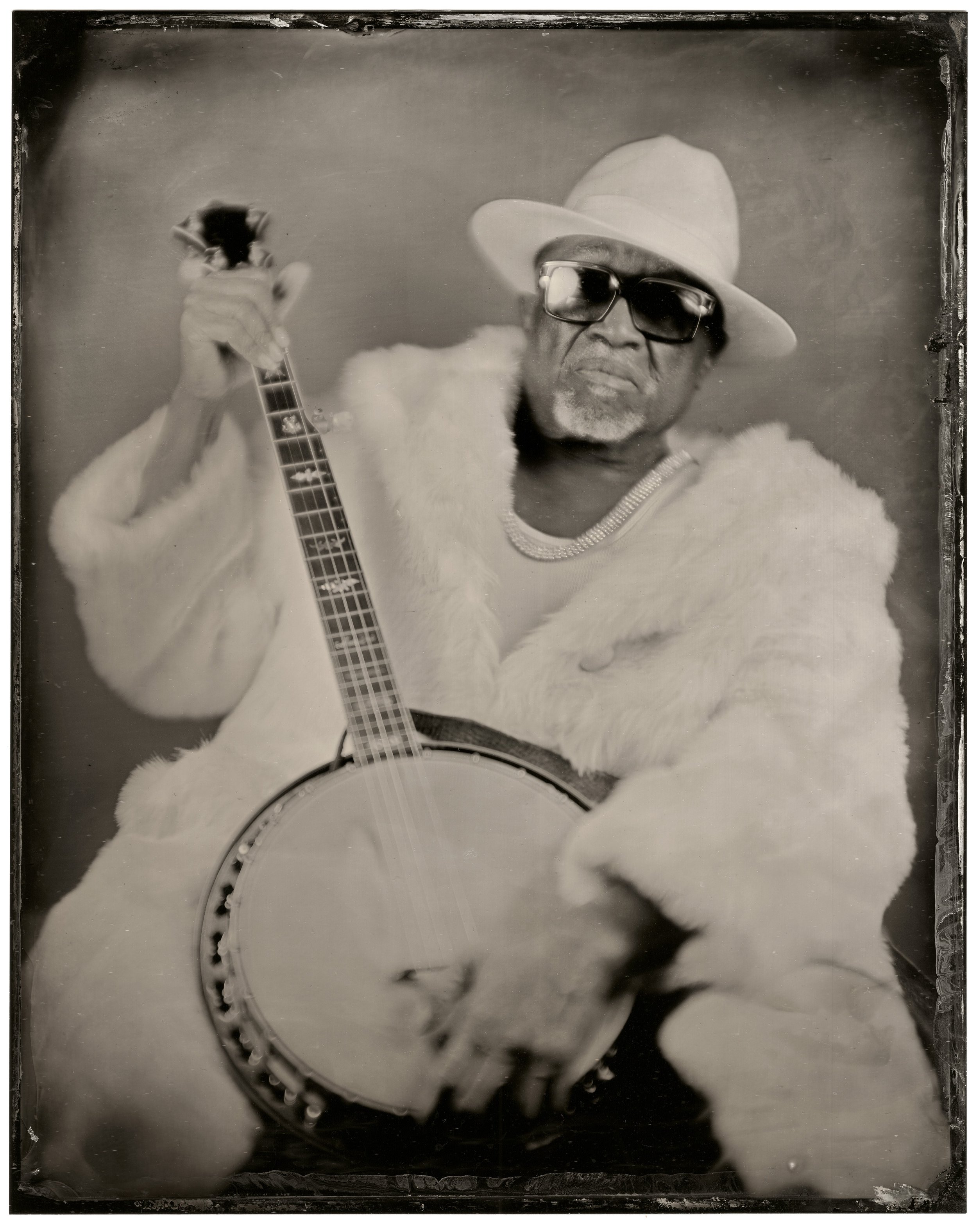Click Image to Download!
“Not a lot of people talk about the true origins of bluegrass music,” says Swamp Dogg, “but it came from Black people. The banjo, the washtub, all that stuff started with African Americans. We were playing it before it even had a name.”
Swamp Dogg’s remarkable new album, Blackgrass: From West Virginia to 125th St., is no history lesson, though. Produced by Ryan Olson (Bon Iver, Poliça) and recorded with an all-star band including Noam Pikelny, Sierra Hull, Jerry Douglas, Chris Scruggs, Billy Contreras, and Kenny Vaughan, the collection is a riotous blend of past and present, mixing the sacred and the profane in typical Swamp Dogg fashion as it blurs the lines between folk, roots, country, blues, and soul. The tracklist is an eclectic one—brand new originals and vintage Swamp Dogg classics sit side by side with reimaginings of ’70s R&B hits and timeless ’50s pop tunes—but the performances here are thoroughly cohesive, filtering everything through a progressive Appalachian lens that nods to tradition without ever being bound by it. Special guests like Margo Price, Vernon Reid, Jenny Lewis, Justin Vernon, and The Cactus Blossoms all add to the excitement, but it’s ultimately the 81-year-old Swamp Dogg’s delivery—sly and playful and full of genuine joy and ache—that steals the show. The result is a record that’s as reverent as it is raunchy, a collection that challenges conventional notions of genre and race while at the same time celebrating the music that helped make Swamp Dogg the beloved iconoclast he’s known as today.
“I’m trying to touch on every kind of music I grew up loving and listening to,” he explains. “This is my way of letting people know that I’m not just a soul singer or whatever they think I am. I’m so much more.”
Born Jerry Williams, Jr., Swamp Dogg first encountered bluegrass music on the radio growing up in Portsmouth, VA, in the 1940s. Though he would go on to spend much of the ’50’s and ’60s immersed in the world of soul, funk, and R&B—both as an artist and as a A&R man/producer working with the likes of Patti LaBelle, The Commodores, and The Drifters—roots music would remain an important fixture in his life.
“I loved George Jones, Flatt & Scruggs, all of it,” he explains. “One of my songs even went all the way to #2 on the country chart when Johnny Paycheck recorded it.”
By that time, Williams had already traded in his birth name for the Swamp Dogg moniker, partly as an act of rebellion against the confining racial and commercial politics of the music industry, and partly as an embrace of his natural inclination towards irreverence and eccentricity. "I needed an alter ego because I wanted to say some things," he would later tell NPR. "I wanted to be able to talk about sex, religion, politics; I wanted to sing about everything." And sing about everything he did. Beginning with 1970’s Total Destruction To Your Mind, Swamp Dogg would go on to release a string of more than two dozen albums ranging from the radically subversive to the downright ridiculous, developing an underground following in the process that would make fans of everyone from DMX to John Prine. Though most of his records (with their oddball titles and even more bizarre artwork) would go woefully underappreciated in their own time, critics and audiences alike would eventually come to see Swamp Dogg for the visionary he was: The New York Times praised his “salty, earthy Southern-soul storytelling;” Rolling Stone hailed his catalog full of “classics that have influenced generations of younger musicians;” The Independent dubbed him a “psychedelic soul original;” The Fader declared him a “legend;” Pitchfork called him “one of pop’s great cult acts;” and Vice crowned him “the unsung king of soul music.”
But, as the SXSW-premiered documentary Swamp Dogg Gets His Pool Painted reveals, there’s always been more to Swamp Dogg than just soul music. As far back as the early 1970s, he was covering tunes like Prine’s “Sam Stone,” an act of veneration that Prine would later return by appearing on Swamp Dogg’s widely acclaimed 2020 record, Sorry You Couldn’t Make It. Those performances turned out to be some of Prine’s final recordings before his death, making Blackgrass’s release on Prine’s Oh Boy label all the more poignant.
“It means a hell of a lot to put this record out on the label that John started,” Swamp Dogg reflects. “He wrote some of the greatest songs of all time, songs that could make you dance inside. He was like a pastor on Sunday, getting you to think about what’s going on in the world and how we should be coping with it. I always want to give thanks to John.”
When it came time to record Blackgrass, Swamp Dogg called once again on Ryan Olson, who’d produced Sorry You Couldn’t Make It (along with 2018’s similarly celebrated Love, Loss, and Auto-Tune).
“I had the concept, but Ryan knew all the right musicians to bring in for this record,” says Swamp Dogg, who relocated from his home in California to Nashville for the sessions. “He took care of the band and got the best of the best in there so I could just concentrate on singing,”
There’s no affectations here, though, no acting a part or pandering to stylistic expectations. Despite the journey deep into old school bluegrass territory, Swamp Dogg remains his quirky, idiosyncratic, and utterly compelling self throughout the record.
“Believe it or not, I didn’t do anything but sing these songs the way I would have sung them if it was an R&B album,” he explains. “That’s just the way the music comes out of me, and it would have been unholy for me to try and imitate anybody else.”
That authenticity is on display from the very start of Blackgrass, which opens with the bawdy “Mess Under That Dress.” Pairing virtuosic bluegrass instrumentation with wryly lewd lyricism, the song sets the stage for the kind of album only Swamp Dogg could make, one that balances absurdity and sincerity in equal measure. The loping “Ugly Man’s Wife,” for instance, offers some tongue-in-cheek relationship wisdom (“Take my advice / I ain’t gonna tell you twice / If you want to live the high life / Become a ugly man’s wife”), while the devastating “Curtains On The Window” reckons with existential pain of loneliness and despair (“I heard the doormat whisper to the carpet / ‘I guess her mind’s made up so let her go’ / The roses in the flowerbed were all dying / While the house and I cried out ‘We love you so’”).
In addition to the newly written material that kicks off the record, Swamp Dogg also revisits several tunes from his past on the album, turning them on their head with an intoxicating bluegrass spin. There’s tracks he originally wrote as R&B numbers (like the liberation anthem “Songs To Sing” and love triangle lament “The Other Woman,” which takes on new life here with Margo Price); tracks he originally produced for other artists (like the yearning “Your Best Friend,” which he recorded The Drifters singing in 1969, and rousing “Rise Up,” which he cut with The Commodores in 1971 and returns to here with Vernon Reid); and tracks he simply loved listening to in his younger years (like the bittersweet “Have A Good Time,” originally made famous by Tony Bennett in 1952, and the effervescent “Count the Days,” first released in 1967 by Inez and Charlie Fox and re-envisioned here with help from Jenny Lewis).
No matter where or when the songs may have come from, though, they all sound distinctly like Swamp Dogg: raw, real, and slightly left of center. Look no further than the haunting album closer “Murder Ballad” to understand the depth and scope of Swamp Dogg’s range. Over a spare banjo and eerie whistling, he mixes spoken word and wailing vocals, recounting a harrowing killing spree with the cold-blooded detachment of Springsteen’s “Nebraska.” “I murdered a man / It was easier than I thought,” the narrator confesses. “I don’t really care about death row or Hell / Or even gettin’ caught.” It’s a far cry from the sentimental “Gotta Have My Baby Back,” but in Swamp Dogg’s capable hands, it all makes sense: lust and heartbreak, pain and ecstasy, revolution and ridiculousness have always sat side by side in his catalog. Why not country and soul, folk and funk, bluegrass and blues?
“Black music has had so many different labels put on it over the years that sometimes I’m onstage and I don’t know what the Hell it is that I’m singing,” Swamp Dogg says with a laugh. “The only thing I know how to do is be myself.”
And nobody does that better than Swamp Dogg.







